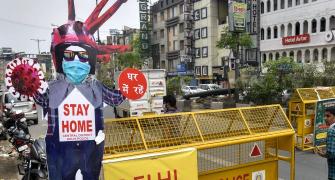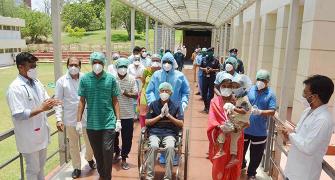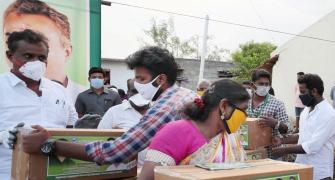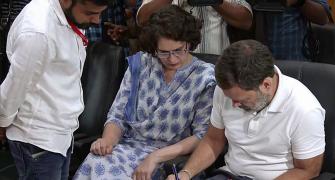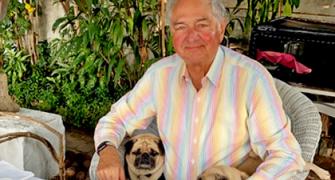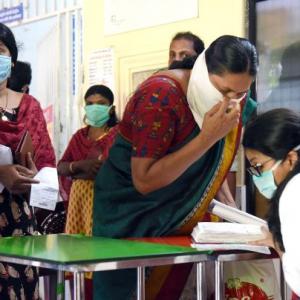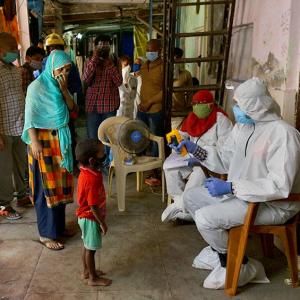'It will take time.'
'It will take time.'
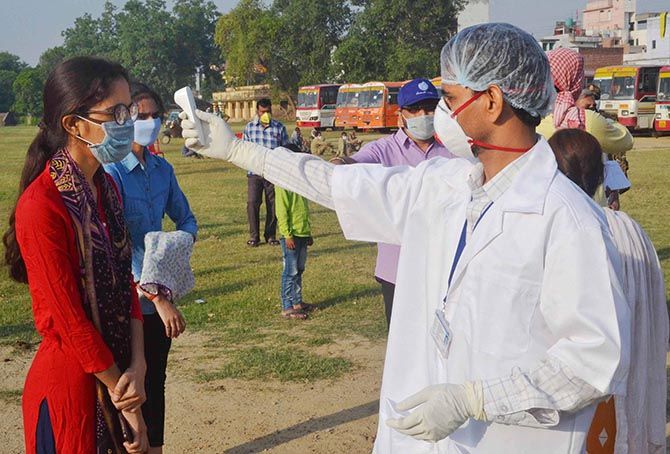
Dr O C Abraham is a senior member of the clinical research group, a medical task force that counsels the Indian Council of Medical Research.
An expert in infectious diseases, he is the professor and head of the department of one of the units of internal medicine at the Christian Medical College, Vellore, Tamil Nadu.
Dr Abraham offers Vaihayasi Pande Daniel/Rediff.com a long-term, cautious, view for India as it confronts the COVID-19 pandemic. The final part of a three-part interview:
- Part I: 'We should get our hospitals ready for the second wave'
- Part II: COVID-19: The threat from people with no symptoms

There is a very practical question from the point of view of an ordinary citizen, whether I am a migrant labourer working in Mumbai who wants to go home to Bihar or I have a daughter studying abroad and I don't know when I'm going to see her.
When will this all end?
Yes.
It will all end when the majority of us are infected and become immune to the virus.
The so-called herd immunity.
That means -- and for each disease it is different -- when the majority are infected, and you develop immunity.
Or a vaccine has to come.
Unless a substantial number of the population becomes immune to the virus, then you also protect the uninfected and susceptible individuals also. That is the whole concept of herd immunity/herd effect.
Till that happens, such kinds of restrictions will be in place -- travel, large gatherings, distancing all those kinds of things will be in place.
It will take time.
It will take time.
So, you are saying we will have to sit put for most of this year, even if there is no lockdown?
Yes.
They are saying when airlines are going to resume, three hours before the flight you will have to check in.
They will encourage people to self-check-in at kiosks or online.
They don't want people to crowd.
All those kinds of restrictions will be in place for quite a while till the majority becomes immune to the virus.

There are conspiracy theories floating about China and about WHO.
COVID-19 was such an unknown virus and a dangerous virus.
It probably caught everybody on the wrong foot, be it China or be it WHO.
That's why it has given rise to all these controversies.
It was a much more dangerous virus than people expected.
And also largely asymptomatic.
That's why nobody could prepare; like you said, it was novel.
Is that true?
Well, it's not that unknown.
It's a relative of a bad virus -- if you look at the genetic sequence it is very closely related to the original SARS coronavirus.
So, it is not that unknown.
People have always predicted the arrival of viruses, microbial pathogens from other species, jungle species.
Initially they will kill a lot of people, once they get adopted to the humans... It is not totally unexpected.
The things we do to animals, forests -- if we encroach on their territory, zoonotic illnesses are going to happen.
Second, nobody was prepared.
Although everybody talks about preparedness, nobody was prepared.
China was not prepared.
USA was not prepared.
In fact, the current president did things which reduced their capacity to deal with an event like this.
Definitely, it is a very highly contagious virus -- I would say that.
It's a true pandemic, infecting lots and lots of people.
But if you really look at the infection fatality rate, that means the denominator of everybody who gets infection, it may not be substantially different from the flu; a little bit more than the pandemic influenza.
May not be all that bad in terms of deadliness -- nowhere near Ebola or SARS-CoV-1 (severe acute respiratory syndrome coronavirus that emerged from China in the early 2000s).
The bad outcomes are for people who are otherwise frail, elderly, or with significant medical problems.
But always the unexpected can happen.
Absolutely healthy, young people can also succumb and have a bad outcome.

As an advisor to ICMR, you would be making suggestions on the changes India would have to put in place after the lockdown.
How will a country enforce social distancing, post the lockdown, given our cultural urges and our cultural tendencies?
Yes, it is going to be extremely difficult.
For somebody who lives in Dharavi, what does social distancing even mean? Doesn't mean anything.
When you have 10 people cooped up in one room, six by six, what is social distancing?
There is no social distancing.
So, these are all realities we have to face (adds with a smile in his voice).
What is your area of concern?
What is the thing that is worrying you about this disease or its spread in India?
For me, my biggest area of concern is the infodemic, which has been associated with this pandemic.
Deliberate misinformation and wrong interpretation of facts in social media, mostly, but even print and television.
All this misinformation has led to kind of an irrational panic.
That is one major concern for me.
Yes, when it started in Wuhan, everybody was worried.
I don't think there was a single person who was not worried.
Overwhelmed that people were dying in large numbers.
Now we have much more information.
It is still not perfect.
Like I said, still the fog is enveloping all of us.
We still have lots of good information.
But unfortunately, misinformation, information overload, misinterpretation of facts, all of that is what is worrying me, which is hampering meaningful response to the pandemic.
Anything about this virus that puzzles you?
Not really.
It is doing what is supposed to do, perpetuating its own self, it is doing it very efficiently.
Survival of the self and survival of the species -- that is what every organism tries to do and it is doing it very efficiently, at the moment.

Production: Ashish Narsale/Rediff.com

